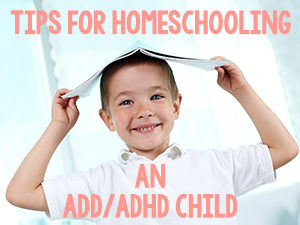
Do you have a child whose attention span is the size of a peanut?
Or do you have a child whose attention span is the size of a peanut AND the energy of a squirrel?
If you have the former, you may have an ADD child. If you have the latter, than you may have an ADHD child.
Before I go any further, let me share with you my opinion on labels like “ADD/ADHD child” or “reluctant learner” or “slow reader.”
I don’t like them. I don’t agree with them. I use them as infrequently as possible.
Why?
Because labels put expectations in the minds of both the child and the adult…bad expectations usually. Let me tell you a story of how I learned this first hand.
Years ago, when I was subbing in a classroom, I had a student that was ADHD. He told me he couldn’t do this and couldn’t do that because of it. He truly believed that he wasn’t capable of doing a lot of things because he was ADHD. That was his expectation of himself.
Sad.
Fast forward a few years. I began homeschooling my children. I knew that one them would be classified as an ADD/ADHD child if I had her tested, however, I refused to do it and I refused to tell her she was that type of child. Instead, I just made simple modifications for her, some of which will be described in this post. This method worked well because she and I never had that expectation, that crutch called ADD/ADHD, to hinder her in her learning. We simply had the expectation that she could learn well and easily, and she did. I will confess that her senior year, I shared with her what I had done and she was glad that I had done it. To this day, she doesn’t see herself as someone who can’t learn or do things because she is “ADD/ADHD.” She just sees herself as someone who has to do something physical on and off throughout her day to get her bounciness out, and that’s okay.
Now, let me share with you what you can do with your little ball of atomic energy.
Homeschooling an ADD/ADHD Child
Stay calm when your child acts out.
Keep in mind that your child isn’t necessarily misbehaving on purpose. He just doesn’t always think before he acts and getting upset will only escalate the problem. Take a few deep breaths, say a prayer, and handle the situation calmly.
Deal with one behavior issue at a time.
Handling too many behavioral challenges at once will overwhelm your child. Take one particular issue and focus on only it for one month. If it is rectified during that time, move on to another. Otherwise, continue working on it for one more month. After that, you may have to just move on to another behavior.
Give your child plenty of breaks.
One of the blessings of homeschooling is that you don’t have to make your child sit still for 6 hours a day. You can allow him to take breaks as often as he needs. This may be every 15, 20, 30, 45 minutes or more. Basically, when you see him getting too restless or losing focus, give him a short break.
Let him be physical.
Give him plenty of opportunities to exercise or be physical in some other ways. This will help him burn off the excess energy that he has and enable him to sit down and focus.
Let him stand at a counter and do his schoolwork.
A homeschool friend of mine found that this worked well for her restless child. While I wouldn’t have him do it all day long, I would definitely let him do it when he feels restless.
Have him sit on a balance ball.
A balance ball will enable him to get some of his energy out while sitting.
Teach according to his learning style.
Is he a visual, auditory, or kinesthetic learner? Is he right-brain or left-brain? Teaching according to the way his brain works will make both your job and his much easier.
Make learning fun!
Boring educational materials only make it harder for him to study. Try to make the subject material interesting and hands-on. Use educational games and puzzles. They will keep his attention better.
Break things down into bite-sized chunks.
If he can’t handle an entire assignment at once, break it down into smaller pieces. Completing those smaller chunks will give him a sense of accomplishment and boost his self-esteem.
Reduce the number of problems in an assignment.
There are no rules saying that your child has to do every problem on a math page (or other subject). I personally used to pick and choose problems for my children to do rather than having them do the whole page. It worked wonders!
Offer choices.
Choice is a motivating factor. Give your child some choices in your homeschooling environment such as the order he does assignments, some of the books he reads, or the sentences he copies for handwriting practice.
Let him use a computer.
While handwriting is an important skill to have, for ADD/ADHD children, it can be an arduous task. When it comes to subjects like Composition, I would allow your child to use a computer rather than pencil and notebook. It will allow him to get his work done much faster and also make it easier for him to correct mistakes.
Reduce the number of distractions.
Keep outside distractions like TV and siblings to a minimum. While you can’t turn off the siblings, you CAN give your ADD/ADHD child a quiet place to work by himself, if necessary.
Let him be a helper in your family in a physical way.
Since these kids need to be physical, I found it useful to let them helpful in a way that expends their energy. Let your child take out the trash, help with the laundry, or take care of pets. Then make him feel appreciated for the help he provides. It’s important that you don’t use the chores as a punishment, but rather as a way to help out the family.
Make sure you have his undivided attention when giving him verbal instructions.
This will help alleviate confusion and misunderstandings. Make eye contact. Smile at him. Give short, concise directions.
Have clear expectations and rules, but be flexible.
Make sure that he knows what is expected of him, but be understanding if he breaks a rule out of carelessness.
Encourage him to laugh at his mistakes and learn from them.
It’s important for you to understand and accept that ADD/ADHD children can be careless. Instead of getting upset over silly mistakes your child makes, laugh with him about them and tell him what he can learn from them.
Focus on his strengths.
As parents, it can be so easy for us to focus on what needs to be fixed with our children rather than on what they do right. Try to make an effort to encourage the things your ADD/ADHD does well. Let him know that his abundant energy is a good thing.It will help boost his self-esteem and make your relationship with him more positive.
Don’t sweat the small stuff.
In the grand scheme of things, does it really matter that he spills his milk every other day? No. What really matters is that you two have a positive, loving relationship. There’s always more milk.
If there is anything that you get out of this post, I hope that you understand this:
Positive expectations produce positive results.
That’s true for not only for an ADD/ADHD child, but for other children as well.
Now go and enjoy your little peanut.






